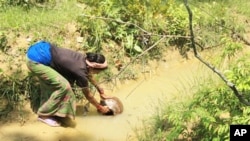Experts say climate change is contributing to more and more conflicts around the world, especially in Africa. Researchers and aid agencies say they are doing their best to help reduce this trend.
At a panel discussion late Tuesday in Washington, Jeffrey Stark from the U.S.-based Foundation for Environmental Security and Sustainability described a worrisome scenario he recently encountered in the central cattle corridor of Uganda.
"We heard basically a consensus that the climate has changed in significant kinds of ways. And so we did hear repeatedly that there had been increasing temperatures, drying wetlands, less frequent but more intense rain, hail storms and most significantly unpredictable shifts in seasonal patterns," said Stark. "The pastoralists in the cattle corridor have to travel farther in search of pasture and water and they encounter cultivators who are having difficulties of their own and they often come into conflict."
Panelists said this trend was repeating itself in many parts of Africa.
They said that, beyond raising the alarm on the link between climate change and conflict, researchers must now help governments, civil society groups and aid agencies prevent natural disasters from turning into war.
Stark, who is currently studying the ongoing drought in southern Ethiopia, said it is important for all affected parties to feel they are being helped equally.
"Any intervention in relation to climate adaptation whether for water, or food, or alternative livelihoods has to be fully understood and explicitly acknowledged as mutually beneficial by all sides," he said. "If it is seen in any way to be favoring one group or another it will just cause conflict, so it is a very difficult and delicate situation."
Other parts of the world are not immune to climate change causing conflict. Janani Vivekananda from the British-based group International Alert has been studying the trend in eastern Nepal, where monsoon rains have been failing in recent years.
"We think of climate change as the risk multiplier, the so-called risk multiplier, as something that will amplify existing social, political and resource stresses, shifting the tipping point at which climate might ignite conflict," said Vivekananda.
Panelists described places with a growing youth population awash in weapons with unresponsive political systems as extremely vulnerable to climate change induced violence.
But Vivekananda said the growing awareness of climate change as a potential problem allowed governments and researchers to discuss these other issues as well.
"Different members of government and of the research community were able to come together and have essentially a discussion on conflict and governance issues but were able to do so because framing it as a climate change discussion meant it was a safe space to bring together these actors and have the discussion," she said.
Cynthia Brady, a conflict advisor from the United States Agency for International Development, was encouraged by the progress being made in the research field of climate change and conflict, particularly with the case studies.
"We are all hopeful that there will be some really significant common lessons learned and that at a minimum we might draw some basic parameters. I hope that we can get there," said Brady. "It might take more than a few case studies but this is kind of our first effort at trying to generate that sort of knowledge."
Brady also stressed the importance of linking work being done at the international negotiation level, such as with the United Nations framework on climate change, and what is taking place at very local levels, where panelists said each climate change scenario has its own particularities, dangers and even opportunities.
Researchers Try to Help Prevent Climate Change Conflict




